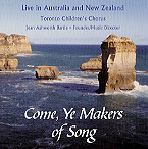There are many really fine children’s choirs in the world–Seattle, Indianapolis, the Czech Republic–but the Toronto Children’s Chorus sets the standard, as it has done since its founding 22 years ago by Jean Ashworth Bartle. This standard applies not only to the sheer level of vocal and ensemble artistry these singers achieve, but also to the consistently excellent and challenging repertoire they master, some of which you can hear on previously issued Marquis recordings that feature music of Britten, Rutter, and Canadian composers. In 1999, at the conclusion of the choir’s 20th anniversary season, the TCC undertook a tour to Australia and New Zealand. This recording and its companion, Songs of the Lights (see reviews), are documents of the concerts they performed there. Remembering that the recordings were made live in six different venues, I must say that producer/engineer Matthew Baird has done a remarkable job in faithfully and realistically capturing the varying singers, instruments, and hall acoustics from 12 different performances.
Highlights include Paul Halley’s Freedom Trilogy, a powerful and unforgettable work I had the good fortune to hear live at the TCC’s 20th anniversary concerts in Toronto two months before the tour began. It artfully combines a Kyrie plainchant with traditional South African songs and the hymn Amazing Grace. We also hear the world premiere performance in Sydney of Canadian composer Srul Irving Glick’s Psalm Trilogy, a substantial work that ends with a beautifully meditative setting of Psalm 23 that easily could stand alone as a concert piece. And, in an excellent tribute to the choir’s lovely unison singing, there’s the “Agnus Dei” from Mozart’s Coronation Mass K. 317, followed by outstanding examples of choral tone and uniform ensemble singing, Mendelssohn’s motet Laudate Pueri and the unaccompanied three-part “Lift Thine Eyes” from Elijah.
Perhaps most impressive is the choir’s performance of the stunningly beautiful a cappella Prayer of St. Francis by Michael Hurd; or would it be the five tricky little songs of Poulenc’s treble choir masterpiece Petites Voix that ends with a spectacular virtuoso flourish? The chorus, demonstrating musical and technical maturity beyond its years, adeptly hides the significant difficulties of performing in unfamiliar, often acoustically tricky spaces, managing logistical and spatial challenges that can occur when instruments (especially organ) are added. The performances aren’t “studio perfect”, especially regarding some moments of slightly “under” intonation and a couple of tempos that feel a little slow (not to mention the occasional inconvenient audience coughs), but when you hear the soaring lines and difficult harmonies of Holst’s eight-part, a cappella Ave Maria sung with such sincerity and authority, you just marvel and are thankful that there are children in the world making such music, led by such capable and devoted teachers and musicians.
































